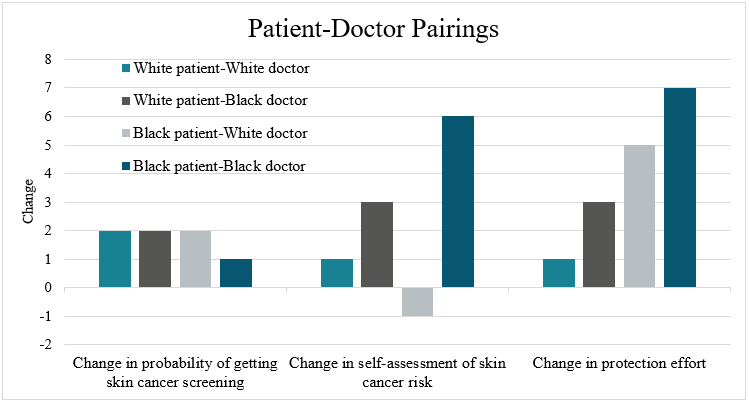Monday Poster Session
Category: IBD
P3250 - Impact of Patient-Provider Race Concordance on Skin Cancer Screening in Inflammatory Bowel Disease
Monday, October 27, 2025
10:30 AM - 4:00 PM PDT
Location: Exhibit Hall

Benjamin Twery, MD (he/him/his)
University of Maryland School of Medicine
Baltimore, MD
Presenting Author(s)
Benjamin Twery, MD1, Sandra Quezada, MD, MS1, Raymond K. Cross, MD, MS, FACG2
1University of Maryland School of Medicine, Baltimore, MD; 2The Melissa L. Posner Institute for Digestive Health & Liver Disease, Mercy Medical Center, Baltimore, MD
Introduction: Patients with inflammatory bowel disease (IBD) are at increased risk for skin cancer, and therefore should receive skin cancer screening. There is data to suggest that patients with IBD, and patients of color, do not receive preventative services at the same rate as other patients. Some of these differences may be accounted for by provider-specific factors, though the data remains mixed. This study aims to examine how race concordance between patient and provider impacts patients with IBD.
Methods: This is a randomized controlled trial including 20 patients (10 Black and 10 White) from the University of Maryland School of Medicine (UMSOM) IBD Program. Participants were provided a set of pre-video questions relating to their perception of skin cancer risk, including willingness to get screened for skin cancer, efforts to protect themselves from the sun, and self-assessment of cancer risk. Then, participants were randomly shown one of two educational videos with a provider describing the risk of skin cancer in patients with IBD, and the importance of skin cancer screening and preventive measures. One video portrayed a Black doctor and the other a White doctor. The participants were then prompted to complete follow-up questions to assess the impact of the video.
Results: The education intervention successfully improved each of our measured outcomes. The video significantly raised willingness to screen for skin cancer (p < 0.01), perceived risk of skin cancer (p < 0.05), and willingness to make protective efforts against the sun (p < 0.01). The education intervention did not, however, result in statistically significant changes between racially concordant and discordant pairings (p = 0.57), or between any of the participant to provider racial pairings (p = 0.19).
Discussion: White participants had modest improvement on each questionnaire item irrespective of assigned group. Conversely, Black participants who received the Black doctor intervention showed improved outcomes, but the Black participants who received the White doctor intervention reported feeling like they were at a lesser risk of cancer than prior to intervention. In summary, we found that racial concordance between patients with IBD and their providers may lead to better adherence to health maintenance recommendations. Though our study is small, the results show trends that racial concordance can influence how patients respond to physician recommendations and should be explored further in larger studies.

Figure: Figure 1. Change in Skin Cancer Self-Assessment After Educational Intervention
Disclosures:
Benjamin Twery indicated no relevant financial relationships.
Sandra Quezada: Johnson and Johnson – Advisor or Review Panel Member. Pfizer – Advisory Committee/Board Member.
Raymond K. Cross: Abbvie – Advisor or Review Panel Member, Consultant, Speakers Bureau. BMS – Advisor or Review Panel Member, Consultant, Speakers Bureau. CorEvitas – Advisory Committee/Board Member. Fresenius Kabi – Advisory Committee/Board Member, Consultant. Genetech – Advisory Committee/Board Member, Consultant. Gilead – Advisory Committee/Board Member, Consultant. IBD Education Group – Advisory Committee/Board Member. Janssen – Advisory Committee/Board Member, Consultant, Grant/Research Support, Speakers Bureau. Magellan Health – Advisory Committee/Board Member, Consultant. Option Care – Advisory Committee/Board Member, Consultant. Pfizer – Advisory Committee/Board Member, Consultant, Speakers Bureau. Pharmacosmos – Advisory Committee/Board Member, Consultant. Samsung Bioepis – Advisory Committee/Board Member, Consultant. Sandoz – Advisory Committee/Board Member, Consultant. Takeda – Grant/Research Support.
Benjamin Twery, MD1, Sandra Quezada, MD, MS1, Raymond K. Cross, MD, MS, FACG2. P3250 - Impact of Patient-Provider Race Concordance on Skin Cancer Screening in Inflammatory Bowel Disease, ACG 2025 Annual Scientific Meeting Abstracts. Phoenix, AZ: American College of Gastroenterology.
1University of Maryland School of Medicine, Baltimore, MD; 2The Melissa L. Posner Institute for Digestive Health & Liver Disease, Mercy Medical Center, Baltimore, MD
Introduction: Patients with inflammatory bowel disease (IBD) are at increased risk for skin cancer, and therefore should receive skin cancer screening. There is data to suggest that patients with IBD, and patients of color, do not receive preventative services at the same rate as other patients. Some of these differences may be accounted for by provider-specific factors, though the data remains mixed. This study aims to examine how race concordance between patient and provider impacts patients with IBD.
Methods: This is a randomized controlled trial including 20 patients (10 Black and 10 White) from the University of Maryland School of Medicine (UMSOM) IBD Program. Participants were provided a set of pre-video questions relating to their perception of skin cancer risk, including willingness to get screened for skin cancer, efforts to protect themselves from the sun, and self-assessment of cancer risk. Then, participants were randomly shown one of two educational videos with a provider describing the risk of skin cancer in patients with IBD, and the importance of skin cancer screening and preventive measures. One video portrayed a Black doctor and the other a White doctor. The participants were then prompted to complete follow-up questions to assess the impact of the video.
Results: The education intervention successfully improved each of our measured outcomes. The video significantly raised willingness to screen for skin cancer (p < 0.01), perceived risk of skin cancer (p < 0.05), and willingness to make protective efforts against the sun (p < 0.01). The education intervention did not, however, result in statistically significant changes between racially concordant and discordant pairings (p = 0.57), or between any of the participant to provider racial pairings (p = 0.19).
Discussion: White participants had modest improvement on each questionnaire item irrespective of assigned group. Conversely, Black participants who received the Black doctor intervention showed improved outcomes, but the Black participants who received the White doctor intervention reported feeling like they were at a lesser risk of cancer than prior to intervention. In summary, we found that racial concordance between patients with IBD and their providers may lead to better adherence to health maintenance recommendations. Though our study is small, the results show trends that racial concordance can influence how patients respond to physician recommendations and should be explored further in larger studies.

Figure: Figure 1. Change in Skin Cancer Self-Assessment After Educational Intervention
Disclosures:
Benjamin Twery indicated no relevant financial relationships.
Sandra Quezada: Johnson and Johnson – Advisor or Review Panel Member. Pfizer – Advisory Committee/Board Member.
Raymond K. Cross: Abbvie – Advisor or Review Panel Member, Consultant, Speakers Bureau. BMS – Advisor or Review Panel Member, Consultant, Speakers Bureau. CorEvitas – Advisory Committee/Board Member. Fresenius Kabi – Advisory Committee/Board Member, Consultant. Genetech – Advisory Committee/Board Member, Consultant. Gilead – Advisory Committee/Board Member, Consultant. IBD Education Group – Advisory Committee/Board Member. Janssen – Advisory Committee/Board Member, Consultant, Grant/Research Support, Speakers Bureau. Magellan Health – Advisory Committee/Board Member, Consultant. Option Care – Advisory Committee/Board Member, Consultant. Pfizer – Advisory Committee/Board Member, Consultant, Speakers Bureau. Pharmacosmos – Advisory Committee/Board Member, Consultant. Samsung Bioepis – Advisory Committee/Board Member, Consultant. Sandoz – Advisory Committee/Board Member, Consultant. Takeda – Grant/Research Support.
Benjamin Twery, MD1, Sandra Quezada, MD, MS1, Raymond K. Cross, MD, MS, FACG2. P3250 - Impact of Patient-Provider Race Concordance on Skin Cancer Screening in Inflammatory Bowel Disease, ACG 2025 Annual Scientific Meeting Abstracts. Phoenix, AZ: American College of Gastroenterology.

